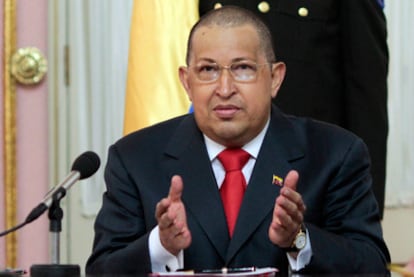Venezuela to release nearly half of its prison population
Chávez likens Libyan rebels to Spain's 15-M protestors
In an effort to ease overcrowding at some of South America's most notorious prisons, the Venezuelan government plans to release around 20,000 of the estimated 50,000 inmates being held in custody.
The announcement was made on Sunday by Iris Varela, the country's new minister for Correctional Services.
Human rights organizations have denounced the Venezuelan prison system as one of the worst in the region, with 50,000 people jammed into cells that only have capacity to hold 14,500.
"Of the country's 50,000 prisoners, 20,000 should be released. They rightly deserve to be out because they have met all legal requirements," the minister said in an interview published Sunday in the Caracas daily El Nacional.
Varela said an exhaustive review had already "identified people who qualify for a suspended sentence."
"They are going to be released with a criminal record saying that they were prosecuted and punished. Once I finish decongesting the system, the rest will be released when they complete their sentences."
The move comes after law-enforcement authorities ended a month-long standoff with a large group of inmates, who took prisoners hostage at the El Rodeo II penitentiary outside Caracas. In what began as a raid in June to confiscate drugs and weapons inside the complex, a series of incidents left 10 inmates and three military officers dead.
According to the NGO National Observatory of Prisons, more than 4,500 inmates have died inside Venezuelan jails and penitentiaries over the past 12 years due to violence and unsanitary conditions. In 2010 alone, 476 inmates died and 958 were injured, according to the figures provided by the NGO.
"New look"
Venezuelan President Hugo Chávez, who was in Cuba recovering from cancer surgery at the time of the El Rodeo incident, showed up at a Cabinet meeting on Monday sporting a neatly shaved head, where small spots of baldness, caused by his chemotherapy treatment, could be seen.
"It's my new look," he told his Cabinet officials in English, a popular way in Latin America to express a change in personal appearance. On Saturday, he told Venezuelans that the next time they saw him in public he would be bald as a result of the chemo treatments for the cancerous tumor he had removed from near his pelvic region on June 20.
During the Cabinet meeting, Chávez came out in support of Libya's Muammar Gaddafi, likening the rebels who are trying to topple his government to the leaders of Spain's 15-M Movement. He also called on governments to "reflect" on the Libyan turmoil because "one day it could happen to any one of us."
"What would the Spanish government do if a Transition Committee was set up in the Puerta del Sol?" he asked.

Tu suscripción se está usando en otro dispositivo
¿Quieres añadir otro usuario a tu suscripción?
Si continúas leyendo en este dispositivo, no se podrá leer en el otro.
FlechaTu suscripción se está usando en otro dispositivo y solo puedes acceder a EL PAÍS desde un dispositivo a la vez.
Si quieres compartir tu cuenta, cambia tu suscripción a la modalidad Premium, así podrás añadir otro usuario. Cada uno accederá con su propia cuenta de email, lo que os permitirá personalizar vuestra experiencia en EL PAÍS.
¿Tienes una suscripción de empresa? Accede aquí para contratar más cuentas.
En el caso de no saber quién está usando tu cuenta, te recomendamos cambiar tu contraseña aquí.
Si decides continuar compartiendo tu cuenta, este mensaje se mostrará en tu dispositivo y en el de la otra persona que está usando tu cuenta de forma indefinida, afectando a tu experiencia de lectura. Puedes consultar aquí los términos y condiciones de la suscripción digital.








































